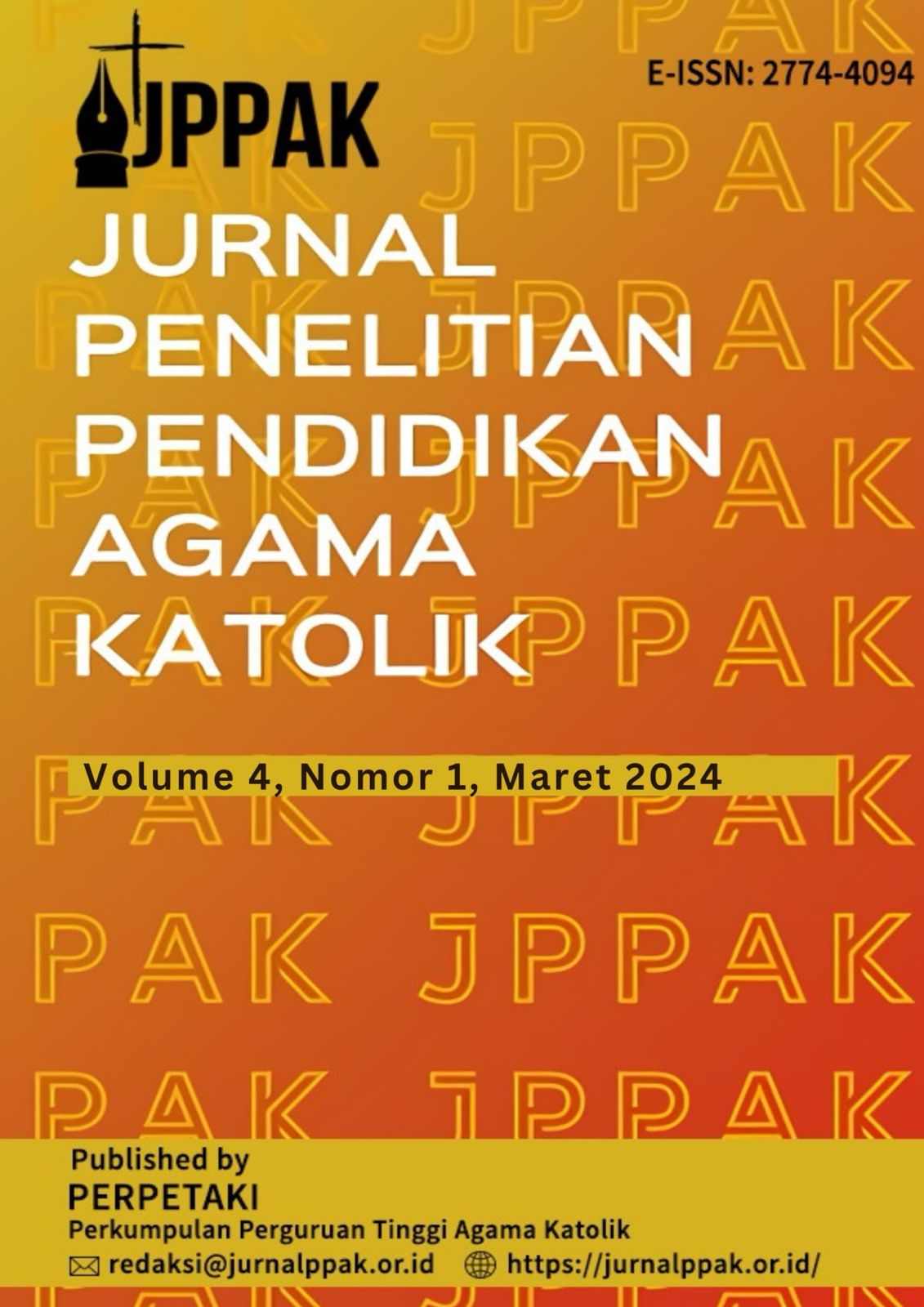Pemahaman Umat Tentang Sakramen Pengurapan Orang Sakit di Stasi Santo Fransiskus Xaverius Klabat, Paroki Santo Fransiskus de Sales Kokoleh
DOI:
https://doi.org/10.52110/jppak.v4i1.131Keywords:
The Sacrament of the Anointing of the SickAbstract
The sacrament of the anointing of the sick is a significant aspect
of the Catholic faith, yet there is a lack of understanding among
some believers. This prompted a study to assess the
comprehension of the sacrament among the churchgoers of
Fransiskus Xaverius Klabat Outpost, St. Fransiskus de Sales
Kokoleh Parish, and explore ways to enhance their
understanding. The study utilized qualitative research methods,
including observation, interviews, and documentation studies,
with data sourced from the St. Fransiskus Xaverius Klabat
Outpost. The findings revealed that the sacrament is intended to
provide healing and strength from God to those who are ill, with
the priest responsible for preparing holy oil, blessing water, and a
prayer formula, and the recipient expected to have candles,
crosses, water, salt, and a readiness to receive the sacrament.
The graces of the sacrament include healing, strength, and
forgiveness of sins. Pastoral efforts, such as brief catechesis, are
being implemented to help people understand the meaning,
purpose, essential elements, and fruits of the sacrament of
anointing the sick.
Downloads
##submission.downloads##
Submitted
Accepted
Published
How to Cite
Issue
Section
License
Copyright (c) 2024 Yudhi Geraldy Moningka, Adrianus Dalia, Bernadina Waha Labuan

This work is licensed under a Creative Commons Attribution-ShareAlike 4.0 International License.
Copyright Notice and Permissions
Jurnal Penelitian Pendidikan Agama Katolik offers immediate open access to all its content on the principle to make researches freely available to the public, especially to the scholars, to support greater global exchanges of knowledge. This journal encourages all scholarly authors to allow their research openly available, free access and without time restrictions.
All articles published Open Access will be immediately and permanently free for everyone to read and download. Under the CC BY-SA 4.0 license, authors retain ownership of the copyright for their article, however authors grant others permission to use the content of publications in Jurnal Penelitian Pendidikan Agama Katolik (JPPAK) in whole or in part provided that the original work is properly cited. Users (redistributors) of Jurnal Penelitian Pendidikan Agama Katolik (JPPAK) are required to cite the original source by including at least: the full title of the article, the author's or authors' full name(s), JPPAK as the initial source of publication, year of publication and volume number using a propriate citing method.
Copyright encompasses exclusive rights to reproduce and deliver the article in all form and media, including reprints, photographs, microfilms and any other similar reproductions, as well as translations. The reproduction of any part of this journal, its storage in databases and its transmission by any form or media, such as electronic, electrostatic and mechanical copies, photocopies, recordings, magnetic media is prohibited without consent of Jurnal Penelitian Pendidikan Agama Katolik (JPPAK).
Jurnal Penelitian Pendidikan Agama Katolik (JPPAK) is licensed under a Creative Commons Attribution Share-Alike 4.0 International. (CC BY-SA 4.0)
Authors who publish with Jurnal Penelitian Pendidikan Agama Katolik (JPPAK) agree to the following terms:
- Authors retain copyright and grant the journal right of first publication with the work simultaneously licensed under a Creative Commons Attribution Share-Alike 4.0 International (CC BY-SA 4.0) license that allows others to share the work with an acknowledgement of the work's authorship and initial publication in this journal.
- Authors are able to enter into separate, additional contractual arrangements for the non-exclusive distribution of the journal's published version of the work (e.g., post it to an institutional repository or publish it in a book), with an acknowledgement of its initial publication in this journal.
- Authors are permitted and encouraged to post their work online (e.g., in institutional repositories or on their website) after the publication on JPPAK, as long as it not published on other OJS for it will be treated as plagiarism by plagiarism checker apps. It can lead to productive exchanges, as well as earlier and greater citation of published work (See The Effect of Open Access).












